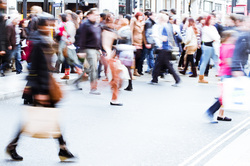
Let’s lift this out of the minutiae of the actual shopping experience and consider a broader, more sinister issue going here, it’s called materialism. Our society seems affected by materialism in two ways – either seeking happiness through material goods or using those goods as the measure of our success. I think this is what disturbed me so much while observing the manic shoppers, it wasn’t just that they looked stressed and hassled, they seemed to have something much deeper driving their needs – the need for external approval or validation for their gifts. What if their present wasn’t good enough – does that mean you’re not good enough? What if someone else got something better than you did – is the other person better than you?
Materialism forces us into comparisons which are fuelled by media. Instagram, Facebook, Twitter and the World Wide Web promote this form of measure, which very few of us can live up to, ultimately leaving us feeling inadequate. Here’s the sad catch – the material pursuit of self-esteem actually reduces our self-esteem.
These daily doses of materialism lead us to believe that having money and possessions enhance our wellbeing (you only have to look at some photos of the Rich Kids of Instagram to see how happy and smug they are looking). Yet the science tells that this is a very misguided belief. Materialism undermines personal and social wellbeing. Look closely at those rich kids flaunting their goods and there’s something that jumps out, mostly they are alone with their riches. Their eyes don’t look happy to me. Where are their friends? Our happiness and psychological well-being is significantly enhanced through being around friends, not possessions.
Gift giving does enhance our positive feelings but not when it’s done as some sort of contest for love and affection in return. The more expensive the present, the more you should be admired in return, right? No, this will not bring you any long term happiness. This applies equally to the rich and the poor; this isn’t just an issue for the wealthy.
There are so many free ways to give at Christmas that will actually create a far more meaningful experience for you and the receiver. We don’t need to compete with expensive presents. I’m not naive enough to expect people not to buy anything, but all the scientific measures will tell you that real happiness and joy come from a different place. Try these:
- Write a personal note, from the heart, about what you’re grateful to the recipient for. Reflect on what you most respect, admire or appreciate about them and let them know.
- In lieu of gifts, make a donation to a charity. Do this as a family, all contributing something (if your children are small, even 20 cents is fine, it’s the experience that matters). Then sit together and decide which charity you will give it to, and talk about the difference that it could make.
- Give a gift to someone that you don’t know. Give it away through the Salvation Army or local Food Shelter.
- At the Christmas dinner table, invite your friends and family to share their successes and joys from the year. Use ‘Active Constructive Responding’ to create strong and positive interactions.
- Buy experiences, rather than material gifts. Experiences are hard to put a material measure against, they give the recipient something to look forward to (optimism towards our future is beneficial for well-being) and most experiences are done with others and not alone, creating connectedness. You could give a voucher to a picnic that you supply; a massage that you give; doing the dishes; a walk on the beach or going mud sliding together.
I wish you a very special Christmas day, sharing in the real riches of this world – love, friendship, caring and joy.


 RSS Feed
RSS Feed